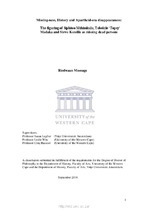| dc.description.abstract | The argument of this dissertation calls for an abiding by missing-ness as it relates to apartheid-era disappearances. I am concerned with the ways in which the category missing is articulated in histories of apartheid-era disappearances through histories seeking to account for apartheid and how that category is enabled and /or constrained through mediating practices, processes and discourses such as that of forensics and history itself. My deployment of a notion of missing-ness therefore is put to work in underscoring notions of history and its relation to a category of missing persons in South Africa as they emerge and are figured through various discursive strategies constituted by and through apartheid’s violence and iterations thereof.
I focus specifically on the enforced disappearances of Siphiwo Mthimkulu, Tobekile ‘Topsy’ Madaka and Sizwe Kondile and the vicarious ways in which they have been produced and (re)figured in a postapartheid present. Mthimkulu and Madaka were abducted, tortured, interrogated, killed and their bodies disposed through burning by apartheid’s security police in 1982. In 2007 South Africa’s Missing Persons Task Team exhumed commingled burnt human fragments at a farm, Post Chalmers. After two years of forensic examinations, those remains were identified as most likely those of Mthimkulu and Madaka. Their commingled remains were reburied in 2009 during an official government sanctioned Provincial re-burial. Kondile was similarly abducted in 1981 and after being imprisoned, tortured, interrogated and killed, his physical remains were burnt. The MPTT has been unsuccessful in locating and thus exhuming his remains for re-burial. Sizwe Kondile remains missing.
Missing-ness as I evoke it serves to signal the lack and excess as potentiality and instability of histories accounting for the condition and symptom of being missing. The productivity of deploying missing-ness and an abidance to it in the ways I argue is precisely in not explicitly naming it, but rather by holding onto its elusiveness by marking the contours of discourses on absence-presence, those which it simultaneously touches upon and is constitutive of. Articulating it thus is to affirm missing-ness as a question that I argue, be put to work and abided by. | en_US |

